General
MURBS Inaugurates New Board, Shares Accomplishments
Published
5 years agoon
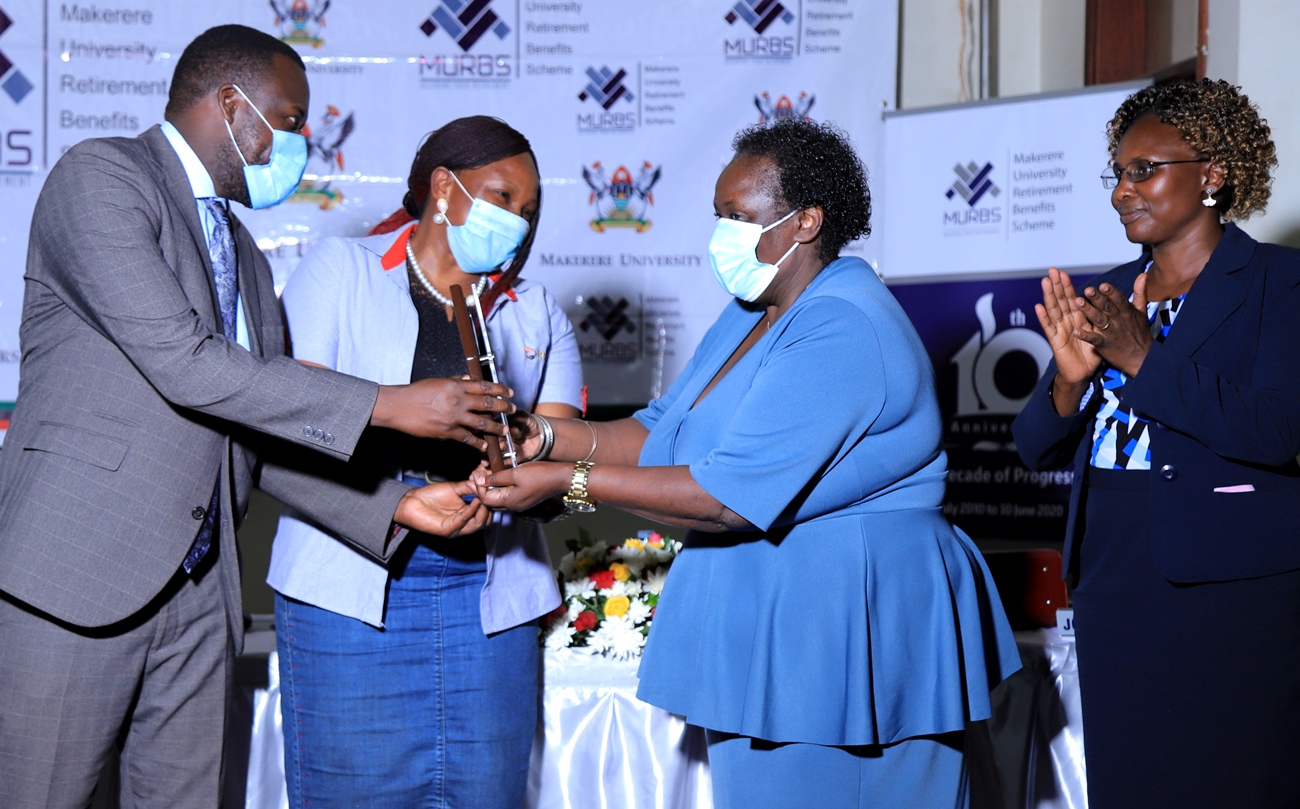
The Makerere University Retirement Benefits Scheme (MURBS) Board of Trustees (BoT) on Friday 26th March, 2021 inaugurated two new members to replace those whose terms are set to expire on 31st March 2021. Makerere University Administrative Staff Association (MASA) representative Ms. Dorothy Nannozi Kabanda will be replaced by Ms. Franco Angida Mugyema while the National Union of Education Institutions (NUEI)’s Mr. John Peter Okello will be replaced by Mr. Joseph Ikarokok.
The two will join existing BoT Members; Dr. Godwin Kakuba (current Chairperson), Mr. Wilber Grace Naigambi (Current Secretary) and Mr. William Ndoleriire (University Council Nominee). Dr. Kakuba joined the current Board as Makerere University Academic Staff Association (MUASA) representative in the place of Dr. John Kitayimbwa who retired from University Service. He remains eligible to serve on the incoming BoT’s term which will run from 1st April 2021 to 31st March 2025.
Welcoming the audience, Mr. Naigambi said that change in leadership of the BoT occurs every four years as mandated by Clause 7 of the MURBS Trust Deed dated 17th April 2015. He added that the handover was in line with Uganda Retirement Benefits Regulatory Authority (URBRA) Act provisions of service for Trustees (not exceeding four years but subject to renewal for a maximum of two terms).
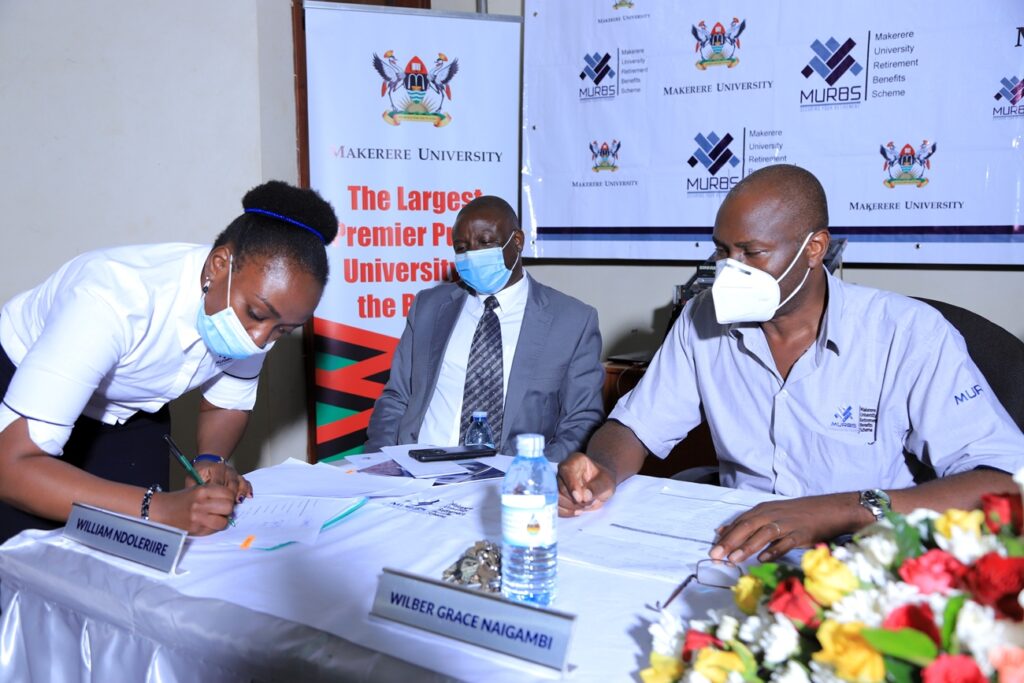
He recognized the presence of the URBRA Director Legal-Mrs. Ritah Nansasi Wasswa who represented the CEO Mr. Martin Nsubuga, Ag. Deputy Vice Chancellor (Finance and Administration)-Dr. Josephine Nabukenya as well as Council Members-Dr. Tumps Ireeta, Dr. Helen Nambalirwa Nkabala and Mr. Jackson Byamukama. Also recognized were the Principal College of Engineering, Design, Art and Technology (CEDAT)-Prof. Henry Alinaitwe, Chair MUASA-Dr. Deus Kamunyu Muhwezi, Chair MASA-Mr. Vincent Abigaba, Chair NUEI-Mr. Bruce Twesigye, College Ambassadors as well as MURBS Service Providers. These included; Stanbic Bank, Octagon Africa, GenAfrica Asset Managers, ICEA Uganda and Arcadia Advocates.
The Chairperson BoT in his remarks thanked the audience for attending the handover ceremony, which signified their interest in MURBS’ vision to deliver “outstanding service and retirement security for members – today and tomorrow”. He thanked the outgoing BoT Members for working tirelessly and efficiently to ensure that the Scheme’s vision is realized.
“When the outgoing Board of Trustees took over in 2017, our fund value stood at UGX 140 Billion and today, it stands at over UGX 210 Billion. The outgoing Board has added almost half of the standing value of the fund and I thank our Sponsor Makerere University and all our service providers for this achievement” Dr. Kakuba commended.
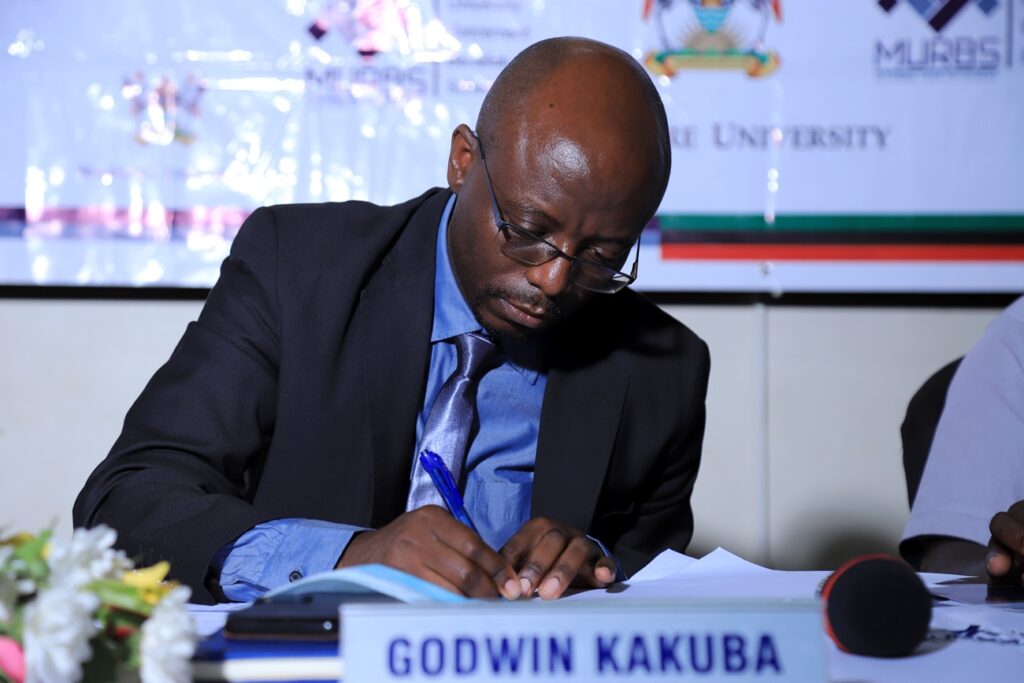
Other accomplishments attributed by the Chairperson to the outgoing BoT included:
- Streamlined Governance: The BoT standardized 12 policy documents which have enhanced the Scheme’s operations
- Improved Collections: Thanks to; timely contributions by the Sponsor Makerere University, clearing half of the outstanding debt owed to the scheme by the Government as well as continuing efforts to clear the balance
- The Ambassadors Programme: Introduction of a rigorous and vibrant Ambassadors Training Programme which has enabled members to gain in-depth knowledge and skills to manage their retirement, and improved information flow between the BoT and Scheme members.
- Consistent winning of the Financial Reporting (FiRe) Awards: MURBS has won top honours in the FiRe Awards’ Retirement Benefits Scheme (RBS) category for the last 4 consecutive years (2016, 2018, 2019 and 2020).
- Timely Payment of Benefits: Reduced period of receiving retirement benefits upon submission of completed applications by members from 10 to 7 days
- Investment Diversification and Consistent Return on Investment: Pursued prudent means of growing member funds, Awarded an average interest of 12% to Members over the last four years (Interest awarded never went below 10%) and diversified investments into real estate by establishing Ivory Estate Sonde.
- Introduced Board Evaluation: Outgoing Board hired an independent professional external evaluator to appraise its performance and received an approval rating of 80%
Nevertheless, the previous Board tenure was not without its challenges. Dr. Kakuba noted that the BoT needs to do more to sensitize its members. “Members need to start planning for retirement early, and not when they get the six months to the end of their service notification from the Human Resources Directorate.
“Furthermore, Members should also ensure that their human resource records are up to date as any inconsistencies lead to delays in paying out their retirement benefits” explained Dr. Kakuba.
According to the Chairperson, going forward, the BoT will invest more in training human resource and use of Information Systems so as to continue strengthening the Scheme’s governance. The BoT will also create new products so as to increase options for retirees. MURBS already has in place an Annuity Arrangement courtesy of ICEA Uganda.
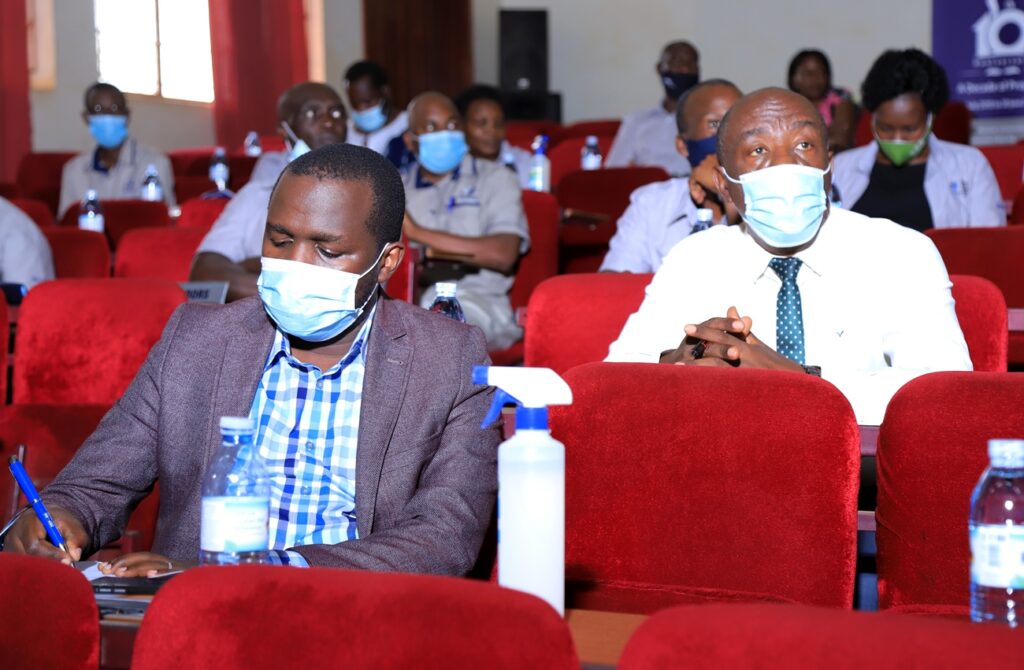
He also made known plans by Trustees to work with the Sponsor to expand the Scheme’s Office space beyond the current Lincoln Flats B4 premises. “And in terms of growth of benefits, currently over 48% of Scheme Members have savings above UGX 150 Million.
“We expect that over the next four years, the majority of members will have savings above UGX 150 Million and the fund value will grow to over UGX 400 Billion” concluded the Chairperson.
Preparing the audience for the official handover ceremony, the Principal Pensions Office (PPO) Ms. Susan Khaitsa thanked outgoing Trustees Mr. John Peter Okello and Ms. Dorothy Nannozi Kabanda for their dedication to the Scheme’s success during their tenure. “We thank you for your service, guidance and leadership as Trustees and as the Secretariat, we are honoured to have worked with you.”
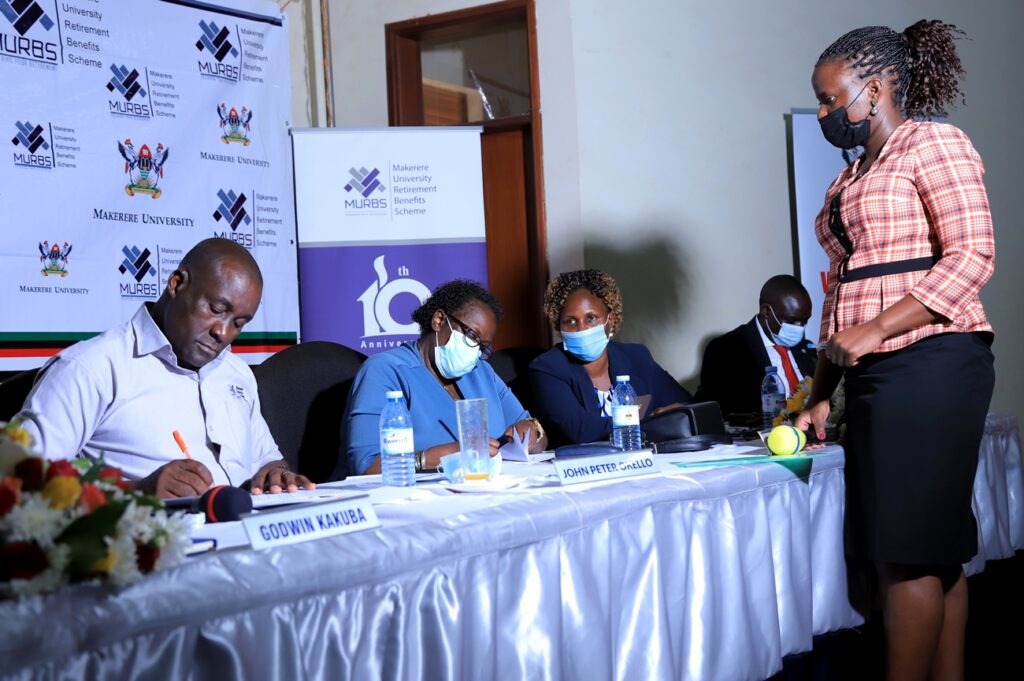
She then introduced Ms. Martha Timugiibwa from the Scheme’s Lawyers Arcadia Advocates to preside over the handover ceremony. As part of the proceedings, outgoing Trustees signed their deeds of discharge and incoming ones signed their deeds of appointment. Incoming Trustees also had to audibly voice their willingness to serve on the new Board, a procedure that greatly amused the audience, given the expectation that contesting in itself is sufficient demonstration of readiness to serve.
According to Ms. Khaitsa, the New MURBS Board will meet next week to appoint a new Chairperson, Secretary and assign various responsibilities to Trustees.
Successfully discharged, it was a lively moment as the Ag. University Secretary-Mr. Yusuf Kiranda and URBRA’s Mrs. Ritah Nansasi Wasswa handed over plaques of recognition to the outgoing Trustees. Speaking on behalf of the duo, Mr. John Peter Okello expressed happiness that they had successfully served until their official discharge from the Board of Trustees.
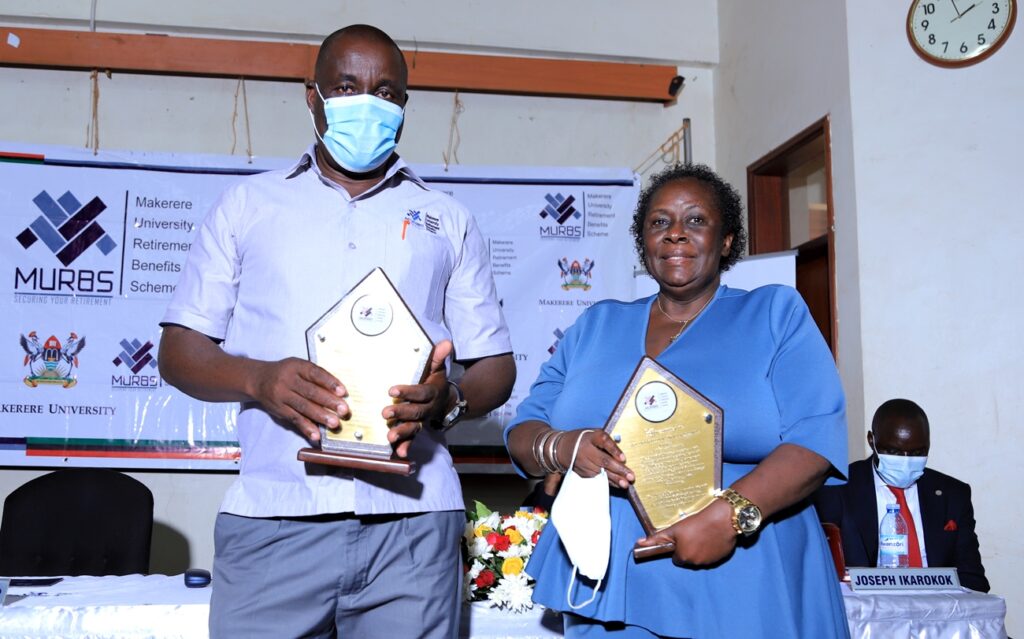
“I thank the team we have worked with during the previous tenure and say to the incoming members, the Board of Trustees is not a bed of roses, don’t ask many questions but instead look for many answers” counseled Mr. Okello.
Speaking on behalf of the new Board of Trustees, Ms. Angida Mugyema thanked and praised God for this far He has brought the Scheme and for the grace granted to incoming Trustees to serve MURBS. She appreciated her predecessors’ efforts to lay a strong foundation based on the Scheme’ values of; Ethics, Stewardship, Transparency, Accountability and Client Focus.
The incoming Trustee equally thanked the Secretariat led by the PPO Ms. Susan Khaitsa and her team; Assistant PPO-Ms. Juliet Nabukeera, Office Administrator-Ms. Rhona Asingwire and Mr. Marvin Kakuba, for the excellent support rendered to the BoT.
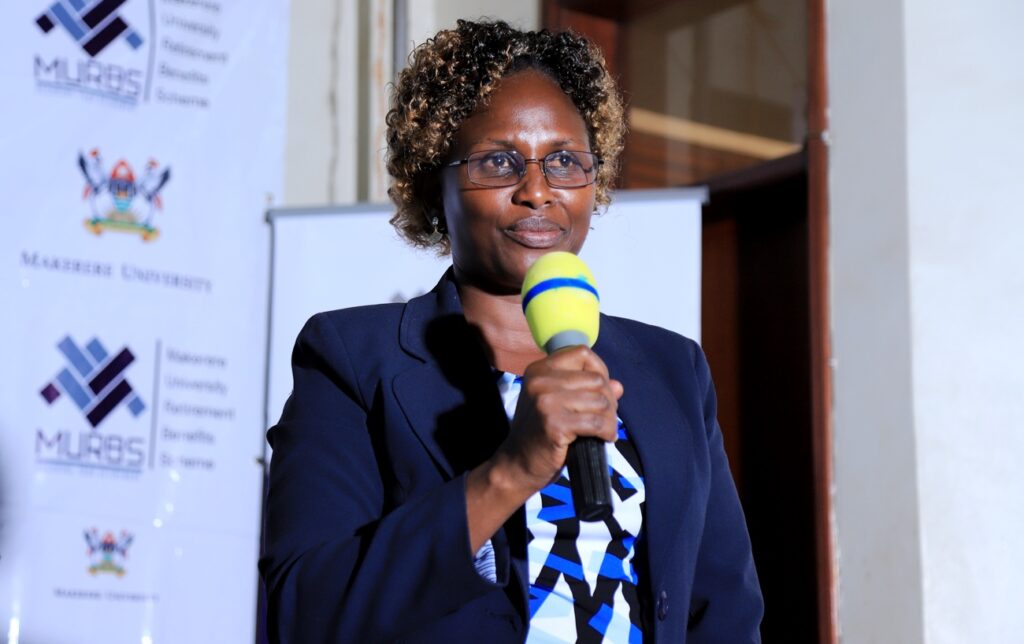
As a member of the first cohort launched on 27th February 2018, Ms. Angida Mugyema was all praise for the rigorous MURBS Ambassadors Programme, whose financial literacy models and other assessments helped her appreciate what is expected of a Trustee.
“If we were told to start today, we are more than ready and willing to work hard, thanks to the preparation we have received” reassured Ms. Angida Mugyema. The Ambassadors Programme serves as a succession strategy for the MURBS BoT. Any Scheme Member interested in contesting to become a MURBS Trustee must be a qualified Ambassador.
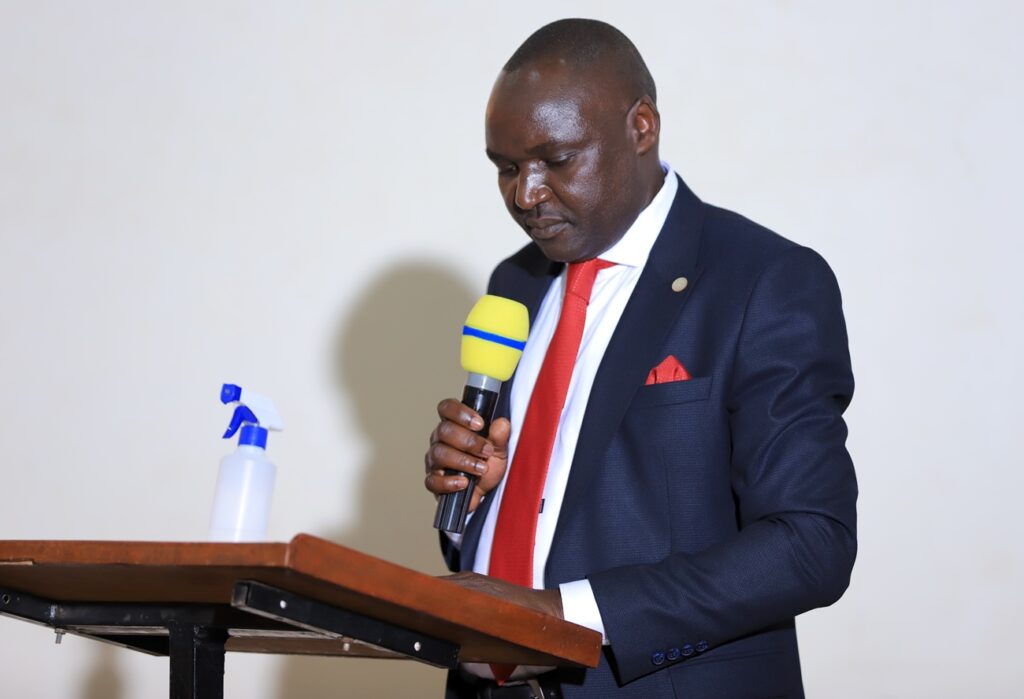
On 1st April 2009, MURBS was established under irrevocable trusts by the Sponsor, Makerere University Council. Speaking on behalf of the Sponsor and University Management, Mr. Yusuf Kiranda said he was extremely honoured to witness a seamless transition of leadership of an entity at the level of MURBS.
“As a member of the Scheme, I am happy to wake up each and every day knowing that my retirement benefits are safe and growing as shown by not only the interest declared but also activities that successive MURBS Boards of Trustees undertake to grow our funds” remarked Mr. Kiranda.
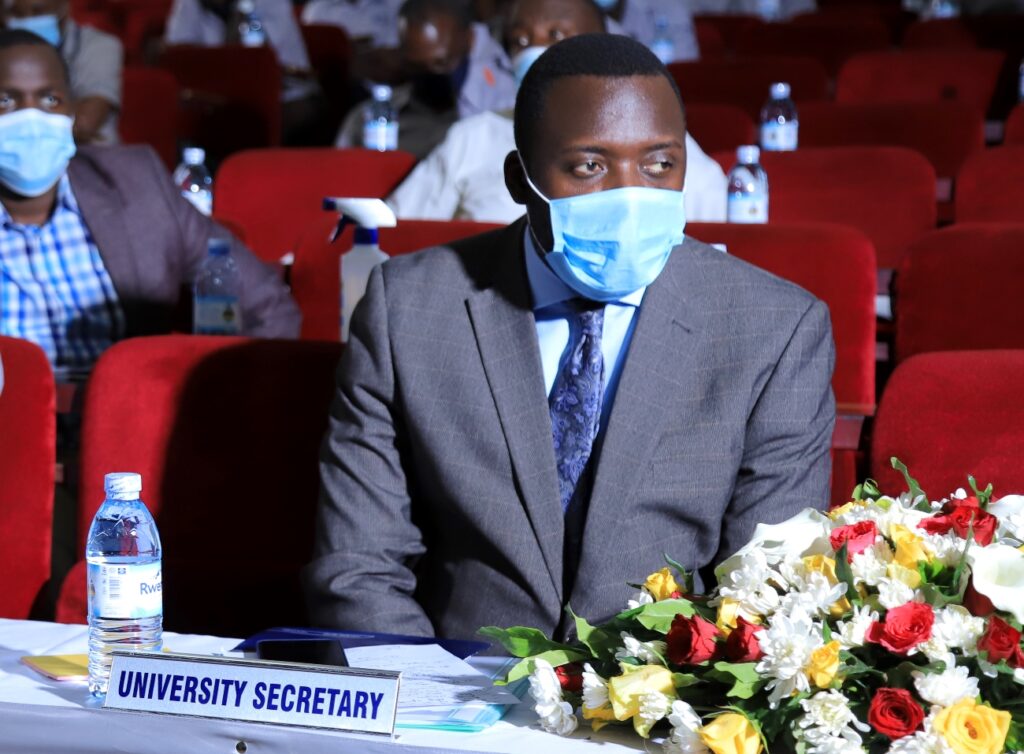
Reflecting on the previous year, the Ag. University Secretary noted that the countrywide shutdown on 20th March 2020 marked the beginning of a difficult period for Makerere University and other employers. Recalling the layoffs and salary cuts that followed with other employers, Mr. Kiranda paid tribute to the Government of Uganda for continuing to pay staff wages on time and enabling the University to recruit new staff as well as make the mandatory 10% contribution to retirement benefits despite COVID-19.
“It is now our turn as Makerere University to thank the Ugandan taxpayer by recognizing that they stood with us during the COVID-19 lockdown and it is now time for us to stand with them as their children report back to Campus to study” he remarked.
Mr. Kiranda congratulated the outgoing Trustees upon successfully completing their tenure and being celebrated by colleagues. To the incoming Trustees he cautioned that stewardship of public funds is extremely difficult as it attracts a lot of scrutiny – shortcomings are heavily criticized and accomplishments are rarely recognized. He therefore prayed that God would enable them to fulfil their obligations to MURBS and its members.
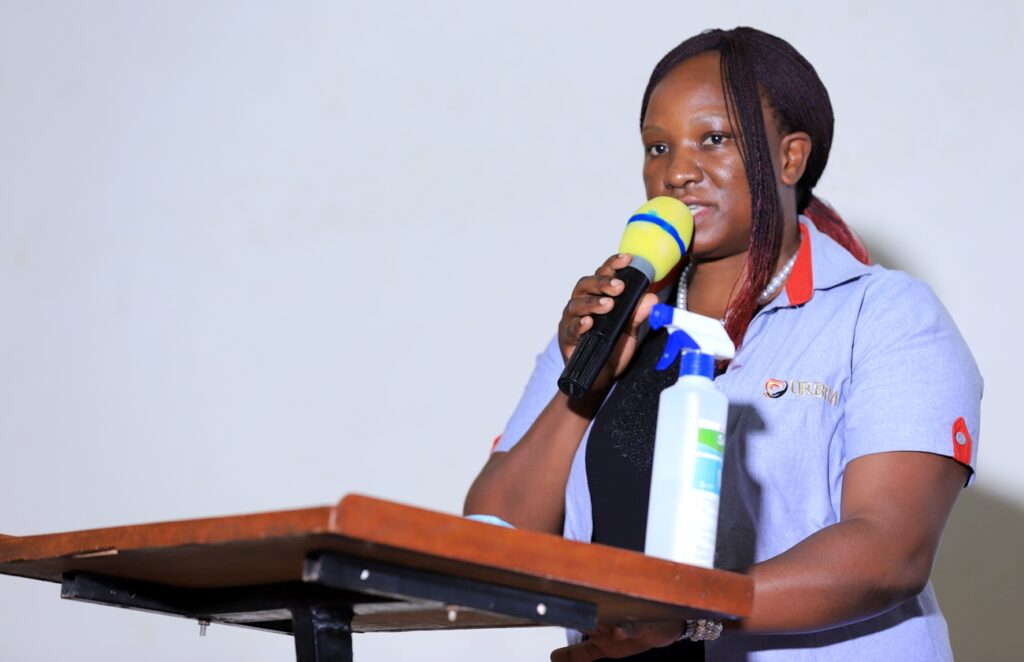
Concluding the day’s remarks, Mrs. Nansasi Wasswa congratulated the outgoing Trustees upon a job well done in keeping MURBS’ light shining brightly. “MURBS is one of the model schemes that URBRA as a regulator is proud of; the fund value has grown, and the Board of Trustees has put in place structures and polices that ensure good governance.”
She equally expressed happiness that the Board of Trustees had retained three of its members, noting that this was good for the Scheme’s continuity. Taking note of the functions of a trustee as outlined in the URBRA Act, 2011, Mrs. Nansasi Wasswa commended the Board for appointing qualified and experienced service providers, who will ensure that they fulfil the legal and other requirements that come with their roles.
The URBRA representative reiterated the regulator’s commitment to support the new Board to continue stewarding and growing the scheme. She accordingly thanked the Sponsor Makerere University Council and MURBS service providers for ensuring that the scheme continues to thrive.
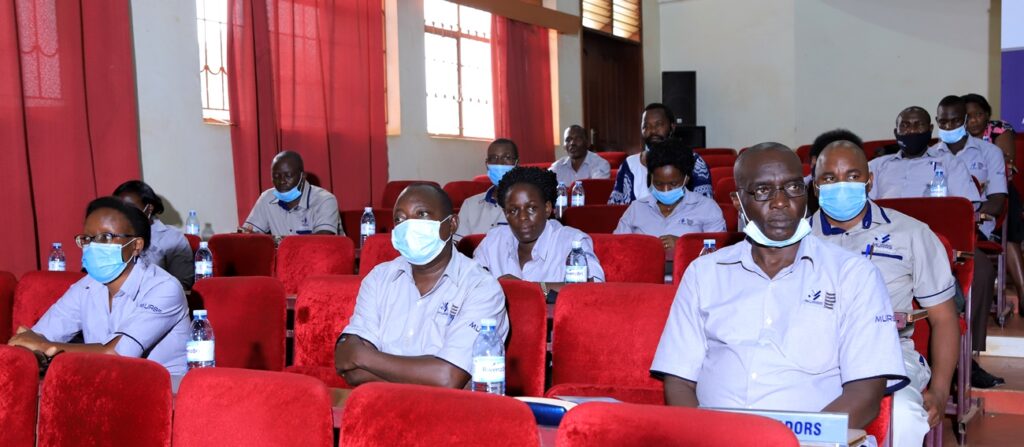
As is the MURBS tradition to honour God at all its gatherings, the opening and closing prayers were led by incoming Trustee, Mr. Joseph Ikarokok and MURBS College of Agricultural and Environmental Sciences (CAES) Ambassador, Prof. Donald Kugonza respectively. The event was moderated by Assistant PPO, Ms. Juliet Nabukeera.
Article by Public Relations Office
Related articles
MURBS Declares 10.6% Interest, Launches Annuity Arrangement & Property Project
You may like
-


Holistic Retirement Planning includes Psychological, Emotional & Social well-being across all Career Stages
-
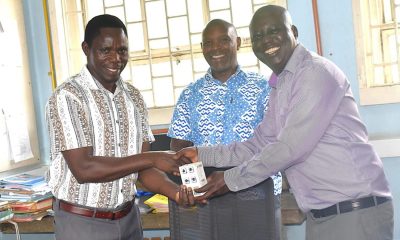

Dr Oruru Bosco Appointed Head of the Department of Physics
-
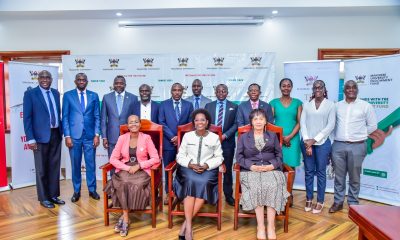

Mak Endowment Fund 3rd Board of Trustees Inaugurated
-
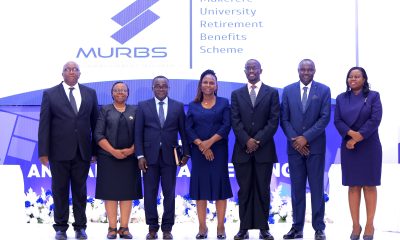

MURBS Declares 13.56% Interest for FY 2024/2025
-
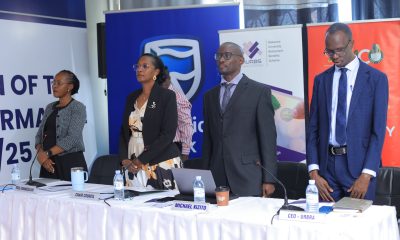

MURBS celebrates growth in FY2024/25 performance
-
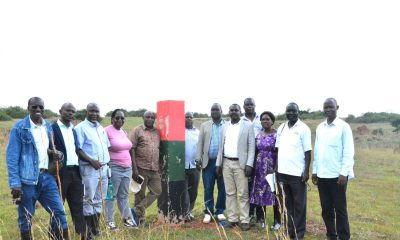

Makerere University Secures UGX 980 Million to Construct a Student Hostel at Buyana Stock Farm
General
Over 9,200 to graduate at Makerere University’s 76th Graduation
Published
5 hours agoon
February 24, 2026
Pomp and colour defined the opening day of the Makerere University’s 76th Graduation Ceremony as thousands gathered to celebrate academic excellence and new beginnings.
The historic ceremony has brought together scholars, families, friends and industry partners in a vibrant celebration of achievement and possibility. Throughout the four-day event, the University will confer degrees and award diplomas to 9,295 graduands in recognition of their dedication and hard work.
Among the graduates, 213 will receive Doctor of Philosophy (PhD) degrees, 2,503 will graduate with Master’s degrees, and 6,343 will earn Bachelor’s degrees. In addition, 206 students will graduate with postgraduate diplomas, while 30 will be awarded undergraduate diplomas.
Of the total number of graduands, 4,262 are female and 5,033 are male. According to Vice Chancellor, this marks the first time in 15 years that male graduands have outnumbered their female counterparts.
The best overall graduand in the Sciences, Esther Ziribaggwa, graduated on the opening day with the Bachelor of Agricultural and Rural Innovation and an impressive Cumulative Grade Point Average (CGPA) of 4.77.

The ceremony marks a proud moment for Makerere University as it continues to nurture top-tier professionals across diverse fields.
While presiding over the graduation, the State Minister for Primary Education, Hon. Dr. Joyce Moriku Kaducu, on behalf of the First Lady and Minister of Education and Sports, Hon. Janet Kataaha Museveni, pointed out that Makerere University is a model institution, where leaders are nurtured, scholars are sharpened, and where dreams have been given direction.
In her address, Hon. Museveni, highlighted Government’s deliberate investment in research, innovation, and infrastructure to strengthen higher education in Uganda.
“The establishment of the Makerere University Research and Innovation Fund (RIF), supports high-impact research and innovation that directly contributes to national priorities and development. Through this initiative, thousands of researchers and innovators have pursued practical, scalable solutions that are transforming communities and key sectors across Uganda,” Mrs Museveni, said.
The Minister also noted that Parliament’s approved a USD 162 million concessional loan to upgrade science, technology, and innovation infrastructure at Makerere University. The funding will facilitate the construction of modern laboratories, smart classrooms, and state-of-the-art facilities for Engineering and Health Sciences, investments expected to position the University firmly within the Fourth Industrial Revolution.
“Government has embarked on the construction of a National Stadium at Makerere University and other institutions of higher learning across the country. This will promote physical education, strengthen talent identification, and boost investment in the sports sector,”

Turning to the graduands, the Minister encouraged them to see themselves not merely as job seekers, but as job creators and solution-makers.
Uganda and Africa need innovators who will modernize agriculture; engineers who will build quality infrastructure; healthcare professionals who will strengthen health systems; and educators who will inspire the next generation,” the Honourable Minister said.
She reminded graduates that they are entering a rapidly changing world shaped by Artificial Intelligence, climate change, and shifting global markets. To thrive, she advised them to remain adaptable, creative, and committed to lifelong learning.
She also encouraged graduates interested in entrepreneurship to tap into the Government’s Parish Development Model, which provides community-based financing and production support.
Quoting Proverbs 3:5–6, the Minister urged the graduates to trust in God as they embark on their next chapter.
She extended special appreciation to the Mastercard Foundation for its 13-year partnership with Makerere University in expanding access to education and empowering young people in Uganda and beyond.
In his speech, the Chancellor of Makerere University, Dr Crispus Kiyonga, urged graduands to harness research, innovation and technology to drive Uganda’s transformation.

“This is a milestone in your lives. You have invested time, discipline and hard work to attain these qualifications. It is important that you derive value from this achievement, not only for yourselves, but for your families and for society.” Dr Kiyonga, said.
Dr. Kiyonga expressed gratitude to the Government of Uganda for its continued financial support to the University, particularly the funding allocated under MakRIF, which he described as critical in strengthening the institution’s research capacity.
“Research plays a very vital role in the development of any community. Makerere as the oldest University in the country is doing a significant amount of research, However, more work is required to mobilize additional resources to further strengthen research at the University.” Dr Kiyonga, noted.
Acknowledging the challenges of a competitive job market, Dr. Kiyonga encouraged graduates to think beyond traditional employment pathways.
“It is true that the job market may not absorb all of you immediately. But the knowledge you have acquired is empowering. You can create work for yourselves, individually or in teams.” Dr Kiyonga, said.
He advised the graduands to embrace discipline, integrity and adaptability in the workplace, and to take advantage of technology and digital platforms to innovate and respond to societal challenges.
“Every development challenge presents an opportunity. Believe that you can apply your knowledge to create solutions with impact.” He said.
Addressing the congregation, the Vice Chancellor, Prof Barnabas Nawangwe, congratulated the graduands, particularly staff and societal leaders on their respective achievements.

“I congratulate all our graduands upon reaching this milestone. In a special way I congratulate the members of staff, Ministers, and Members of Parliament that are graduating today as well as children and spouses of members of staff,” Prof Nawangwe, said.
In his speech, Prof Nawangwe, recognized outstanding PhD students, particularly members of staff. who completed their PhDs in record time without even taking leave from their duties.
He called upon graduates not to despise humble beginnings but rather reflect on the immense opportunities around them and rise to the occasion as entrepreneurs.
“You are all graduating with disciplines that are needed by society. We have equipped you with the knowledge and skills that will make you employable or create your own businesses and employ others. Do not despair if you cannot find employment. Instead, reflect on the immense opportunities around you and rise to the occasion as an entrepreneur,” Prof Nawangwe, said.
Prof Nawangwe called upon the graduands of PhDs to use their degrees to transform the African continent.
“As you leave the gates of Makerere I urge you to put to good use the knowledge you have received from one of the best universities in the World to improve yourselves, your families, your communities, your Country and humanity. Let people see you and know that you are a Makerere alumnus because of the way you carry yourself in society with dignity and integrity. Put your trust in God and honour your parents and opportunities will be opened for you,” Prof Nawangwe, said.
Delivering a key note address, Prof. Nicholas Ozor, the Executive Director of the African Technology Policy Studies Network Nairobi, Kenya ((ATPS). Reminded the graduates that a degree is not a finish line but the beginning of accountability. “The world is a complex, fast changing and deeply unequal. Degrees make you responsible for others not better than them,” Prof Ozor, said.

The 76th Graduation Ceremony of Makerere University will be held from Tuesday 24th to Friday 27th February, 2026. A total of 213 PhDs (87 female, 126 male), 2,503 Masters (1,087 female, 1,416 male), 206 Postgraduate Diplomas (80 female, 126 male), 6,343 Undergraduate Degrees (2,999 female, 3,344 male), and 30 Undergraduate Diplomas (9 female, 21 male) will be graduating from all the Colleges.
Ms. Sarah Aloyo and Ms. Nakato Dorothy both students of the Bachelor of Procurement and Supply Chain Management emerged as the best in the Humanities and Best Overall students with a CGPA of 4.93. Mr. Ssewalu Abdul, a Bachelor of Leisure and Hospitality Management student emerged second best in the Humanities with a CGPA 4.90. Ms. Esther Ziribaggwa emerged as the best student in the Sciences with a CGPA of 4.77 in the Bachelor of Agricultural and Rural Innovation, while Mr. Simon Mungudit emerged second best in the Sciences with a CGPA of 4.76 in the Bachelor of Science in Petroleum Geoscience and Production.
Commencement Speakers
- Day 1 – Prof. Nicholas Ozor, the Executive Director of the African Technology Policy Studies Network, Nairobi, Kenya
- Day 2 – Prof. Dr. Maggie Kigozi, Chairperson Makerere University Endowment Fund Board
- Day 3 – Dr. Patricia Adongo Ojangole, Managing Director, Uganda Development Bank Limited
- Day 4 – Ms. Reeta Roy, Former President & Chief Executive Officer, Mastercard Foundation
The 76th Graduation Ceremony will be held at the Freedom Square following the schedule below:
Tuesday, 24th February, 2026
College of Agricultural and Environmental Sciences (CAES)
College of Computing and Information Sciences (CoCIS)
College of Education and External Studies (CEES)
School of Law (SoL)
Livestream Link for Day 1: https://youtube.com/live/wVGPA0FJ9pU
Wednesday, 25th February, 2026
College of Health Sciences (CHS)
College of Natural Sciences (CoNAS)
College of Veterinary Medicine, Animal Resources and Bio-security (CoVAB)
School of Public Health (SPH)
Thursday, 26th February, 2026
Makerere University Business School (MUBS)
College of Business and Management Sciences (CoBAMS)
Friday, 27th February, 2026
College of Engineering, Design, Art and Technology (CEDAT)
College of Humanities and Social Sciences (CHUSS)
Institute of Gender and Development Studies (IGDS)
Makerere Institute of Social Research (MISR)
General
Mak Selected to Host Alliance for African Partnership Africa Office
Published
1 day agoon
February 23, 2026
Makerere University has been selected to host the Africa Office of the Alliance for African Partnership (AAP). The significant milestone that underscores Makerere’s role in fostering research, innovation, and global collaborations across the continent was announced at a meeting of the University’s Central Management with an AAP delegation on 23rd February 2026.
Makerere’s selection was based on the University’s robust commitment, alignment with the AAP’s Strategic Plan, and proven ability to manage consortium activities. The AAP, which was initiated by Michigan State University (MSU) in collaboration with Ten African Universities and agricultural policy research networks in 2016, targets critical challenges in education, youth empowerment, health and nutrition, agri-food systems, science and technology, water, energy, environment, and culture and society.
Addressing the delegation consisting of AAP Co-Directors from MSU, Dr. Jose Jackson-Malete and Dr. Amy Jamison, accompanied by newly-appointed Director of the AAP Africa Office, Dr. Racheal Ddungu Mugabi and Ms. Clare Cheromoi, the Vice Chancellor, Prof. Barnabas Nawangwe who appreciated the choice of Makerere to host the Africa Office said:
“One of the greatest challenges facing African universities is PhD training, particularly supervisory capacity. Through partnerships such as the Alliance for African Partnership we can leverage international expertise to strengthen supervision—whether through training supervisors or through joint supervision arrangements.”
Prof. Nawangwe equally applauded joint initiatives such as the Grant Writing and Publication project, which gave rise to the establishment of a Writing Centre that he said can be used to build capacity in AAP member universities with Makerere as the hub. Officially launched on 21st March 2023, the project is living up to its expectation of becoming a springboard for strong postdoctoral collaborative research for both institutions and other US universities.
Dr. Titus Awokuse, Vice Provost and Dean for International Studies and Programs at Michigan State University (MSU) who attended virtually, reiterated that Makerere’s selection reflects its long-standing commitment to advancing African higher education, research excellence, and meaningful global collaboration.
Reflecting on the origins of the Alliance for African Partnerships (AAP), Dr. Awokuse explained that nearly a decade ago, MSU initiated a transformative conversation in Atlanta centered on the question: How should we partner differently? From this dialogue emerged AAP—an Africa-centered consortium that now brings together 12 institutions across Africa and the United States.

He emphasized that AAP is grounded in equity, mutual benefit, shared leadership, and deep respect for African priorities and expertise. Since its founding, MSU has served as convener and key supporter, working with member institutions to strengthen research collaboration, promote faculty and student engagement, and address shared development priorities.
Dr. Awokuse underscored that AAP’s success is the result of collective vision and commitment, not the efforts of a single institution. He paid tribute to Lilongwe University of Agriculture and Natural Resources for hosting the Africa Office in its early years and acknowledged the foundational leadership of the inaugural Africa Office Director.
He described the launch of the Africa Office at Makerere University as a significant milestone that reinforces Africa-led leadership, strengthens regional collaboration, and enhances responsiveness to emerging opportunities. MSU, he affirmed, remains fully committed to AAP and to working closely with Makerere and all consortium partners to expand collaborative research, nurture the next generation of scholars, and advance Africa-led solutions to global challenges.
The newly-appointed AAP Africa Office Director, Dr. Racheal Ddungu Mugabi is a member of faculty in the Department of Development Studies, Institute of Gender and Development Studies. Her work on intersectional inequalities in Uganda and other Global South regions uniquely positions her to drive collaborative research and partnerships at the Africa Office.
Initially founded by ten African Universities and MSU, AAP now comprises eleven African members including; the African Network of Agricultural Policy Institutes (ANAPRI)-Zambia, Egerton University-Kenya, Lilongwe University of Agriculture and Natural Resources (LUANAR)-Malawi, Makerere University-Uganda, United States International University-Africa-Kenya, Universite Cheikh Anta Diop-Senegal, Universite Yambo Ouologuem de Bamako-Mali, University of Botswana-Botswana, University of Dar es Salaam-Tanzania, University of Nigeria, Nsukka-Nigeria, and the latest, University of Pretoria-South Africa.
These Universites collaborate under Focal Points to advance policy-relevant research and sustainable development. Makerere University’s Focal Point is Prof. Robert Wamala, Director of Research, Innovations and Partnerships (DRIP).
Addressing the University Management, Dr. Jackson-Malete outlined the African Futures Research Leadership Program, which nurtures early career scholars through mentorship and skill-building as one of AAP’s flagship programs. She noted that the Program that prioritizes female participants or men committed to promoting women in higher education has for the first time during its fifth cohort admitted the first male, Dr. Alfadaniels Mabingo from the Department of Performing Arts and Film, Makerere University.
The AAP Africa Office at Makerere will coordinate activities, boost research collaboration, mobilize resources, and enhance global engagements for socio-economic transformation. This aligns with Makerere‘s broader goals of leveraging international expertise to build resilient institutions.
View more photos from the event: https://flic.kr/s/aHBqjCLjoA
Trending
-

 Humanities & Social Sciences2 days ago
Humanities & Social Sciences2 days agoMeet Najjuka Whitney, The Girl Who Missed Law and Found Her Voice
-

 Health6 days ago
Health6 days agoUganda has until 2030 to end Open Defecation as Ntaro’s PhD Examines Kabale’s Progress
-

 Agriculture & Environment5 days ago
Agriculture & Environment5 days agoUganda Martyrs Namugongo Students Turn Organic Waste into Soap in an Innovative School Project on Sustainable Waste Management
-

 General6 days ago
General6 days agoMastercard Foundation Scholars embrace and honour their rich cultural diversity
-

 Health2 weeks ago
Health2 weeks agoCall for Applications: Short Course in Molecular Diagnostics March 2026
